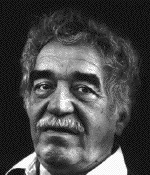
|
Gabriel García Márquez (1928- ) |

|
Gabriel García Márquez (1928- ) |
|
|
For Colonel Aureliano Buendía it meant the limits of atonement. He suddenly found himself suffering from the same indignation that he had felt in his youth over the body of the woman who had been beaten to death because she had been bitten by a rabid dog. He looked at the groups of bystanders in front of the house and with his old stentorian voice, restored by a deep disgust with himself, he unloaded upon them the burden of hate that he could no longer bear in his heart. "One of these days," he shouted, "I'm going to arm my boys so we can get rid of these shitty gringos!" During the course of that week, at different places along the coast, his seventeen sons were hunted down like rabbits by invisible criminals who aimed at the center of their crosses of ash. --from One Hundred Years of Solitude Friday May 17 5:53 PM EDT FEATURE: Colombia's Garcia Marquez In Real-Life Drama By Tom Brown BOGOTA, Colombia (Reuter) - It is not exactly a case of life imitating art, but Colombia's most famous writer Gabriel Garcia Marquez has been caught up in a real-life drama involving a crime he just spent three years writing about, and it could end in tragedy. The Nobel laureate has just produced a heart-wrenching book about a string of high-profile kidnappings that occurred during Colombia's war with ruthless Medellin drug lord Pablo Escobar in 1990. Now, if a shadowy group of kidnappers is to be believed, he has been given the power of life and death over the most prominent kidnap victim Colombia has seen since the collective abductions he describes with a master's touch in ``News of a Kidnapping''. The case into which he has been dragged involves at least two of the protagonists in the non-fiction work, which focuses on 10 kidnappings that riveted Colombia soon after Cesar Gaviria, who served as president from 1990-1994, took office. Gaviria showed what Garcia Marquez calls ``blood-chilling calm'' in dealing with the abductions carried out by Escobar's henchmen to press for a ban on extradition of drug kingpins for trial abroad -- something they eventually won. But the former president, who currently is head of the Organization of American States, has been struggling to maintain that calm since April 2, when a shadowy group calling itself ''Dignity for Colombia'' kidnapped his younger brother Juan Carlos in western Colombia. The group, which claimed responsibility for a murder attempt on President Ernesto Samper's lawyer last September and the assassination of a three-time presidential candidate two months later, is clearly not to be taken lightly. Its main demand so far, in exchange for the younger Gaviria's release, is that Garcia Marquez take over the presidency from Samper, who faces widespread calls for his resignation because of charges that his 1994 election campaign was partly financed by drug traffickers. Garcia Marquez rejected the demand out of hand, saying he was sure he would make ``the worst president'' in Colombia's history. But he has remained silent about a more recent demand in which ``Dignity for Colombia'' asked him to certify, after poring over Gaviria's financial statements, that they showed no sign of corruption or graft during his presidency. In the same communique asking him to assume the presidency, the kidnappers also insisted that Garcia Marquez ensure Gaviria's removal as head of the OAS. Alberto Villamizar, a friend of Garcia Marquez, is Colombia's so-called anti-kidnapping czar, the government official in charge of tracking down and winning the release of Juan Carlos Gaviria. Ironically, it was his own story, about the kidnapping of his wife and sister in 1990, that led Garcia Marquez to spend three years writing ``News of a Kidnapping''. ``It's unusual, but everything that happens in Colombia is unusual,'' Villamizar told Reuters, referring to his ties to Garcia Marquez, his role in shaping the famous author's latest book, and both men's links to the Gaviria kidnapping. Villamizar, who won the release of his sister and wife through negotiations he conducted personally with Escobar, prefers not to discuss the kidnapping of the ex-president's brother. But he said the events of recent weeks have proved too much to ignore even for a country accustomed to levels of kidnapping that would be considered intolerable elsewhere. As a ``humanist,'' he said, he was sure Garcia Marquez would do anything he could to secure Juan Carlos Gaviria' release. As for himself, however, Villamizar said the younger Gaviria was just one of about 500 people currently held hostage in Colombia and took no priority over anyone else. ``For me personally, it's the same if they kidnap the brother of the secretary general of the OAS as if they kidnap any other Colombian,'' he said, adding that his 1,200-man task force was handling the case just like any other. Villamizar, a former lawmaker and ambassador, said he believes Colombia has the highest rate of kidnapping in the world, with a total of about 1,000 cases a year. Leftist guerrillas are responsible for about half and common criminals the rest, he said, adding that extreme poverty and ``a certain culture of easy money that has taken hold in our country'' provide a breeding ground for uncontrolled violence and crime. Given the poor survival rate of most kidnap victims in Colombia, it may take real magic for Villamizar and Garcia Marquez, the master of ``magic realism,'' to see that Juan Carlos Gaviria returns home alive. However the drama ends, Villamizar said he plans on leaving his job soon because ``it's too stressful, too difficult and too dangerous.'' Reuters/Variety
Homepages, Biographies, Bibliographies Articles, Essays, Reviews
|
